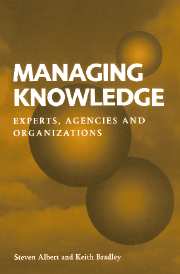Book contents
- Frontmatter
- Contents
- List of figures
- List of tables
- Introduction: the supply-side in context
- Part 1 Expert employees and their new organization
- Part 2 The labour market and the expert employee
- 7 AT&T's special employment policies for expert employees
- 8 An external temporary agency and expert employees
- 9 The Hollywood agency system
- 10 The Internet as an agent
- 11 Labour market segments re-examined
- 12 Agents and intellectual capital
- Appendix A Formal exposition of Winston model
- Appendix B Agency employment and search costs
- Notes
- References
- Index
9 - The Hollywood agency system
Published online by Cambridge University Press: 23 November 2009
- Frontmatter
- Contents
- List of figures
- List of tables
- Introduction: the supply-side in context
- Part 1 Expert employees and their new organization
- Part 2 The labour market and the expert employee
- 7 AT&T's special employment policies for expert employees
- 8 An external temporary agency and expert employees
- 9 The Hollywood agency system
- 10 The Internet as an agent
- 11 Labour market segments re-examined
- 12 Agents and intellectual capital
- Appendix A Formal exposition of Winston model
- Appendix B Agency employment and search costs
- Notes
- References
- Index
Summary
I rebel against any force that threatens to overwhelm me as an individual
Robert Redford, Hollywod star, from Films Illustrated, July 1976The United States film industry displays many of the attributes characteristic of the experts who break employment ties with traditional organizations in favour of an association with a network of agencies which offer a form of economic security and greater discretion over the nature and timing of work. Notwithstanding these similarities, the Hollywood agency system which, among other things, co-ordinates and develops the lives and careers of experts like leading actors, differs from AT&T's in-house agency, Resource Link, which provides alternative employment for underutilized company employees, and the London based temporary agency for accountants, whose development appears to have accelerated as a result of pressure from accountants who wish to have greater control over the timing of their work.
In this chapter we argue that the recent organizational changes experienced by the US film industry has been influenced by Hollywood experts – stars – parting company with the large film production companies in order to obtain greater control over their work and personal lives. This abrupt break results in individuals entering into at-will employment contracts and, in time, a sophisticated agency system. Hollywood's experts severing their employment ties with the major studios and the rise of a network of agencies has shifted some power away from the major studios to an élite group of actors, directors and technicians, and their agents.
- Type
- Chapter
- Information
- Managing KnowledgeExperts, Agencies and Organisations, pp. 132 - 143Publisher: Cambridge University PressPrint publication year: 1997



